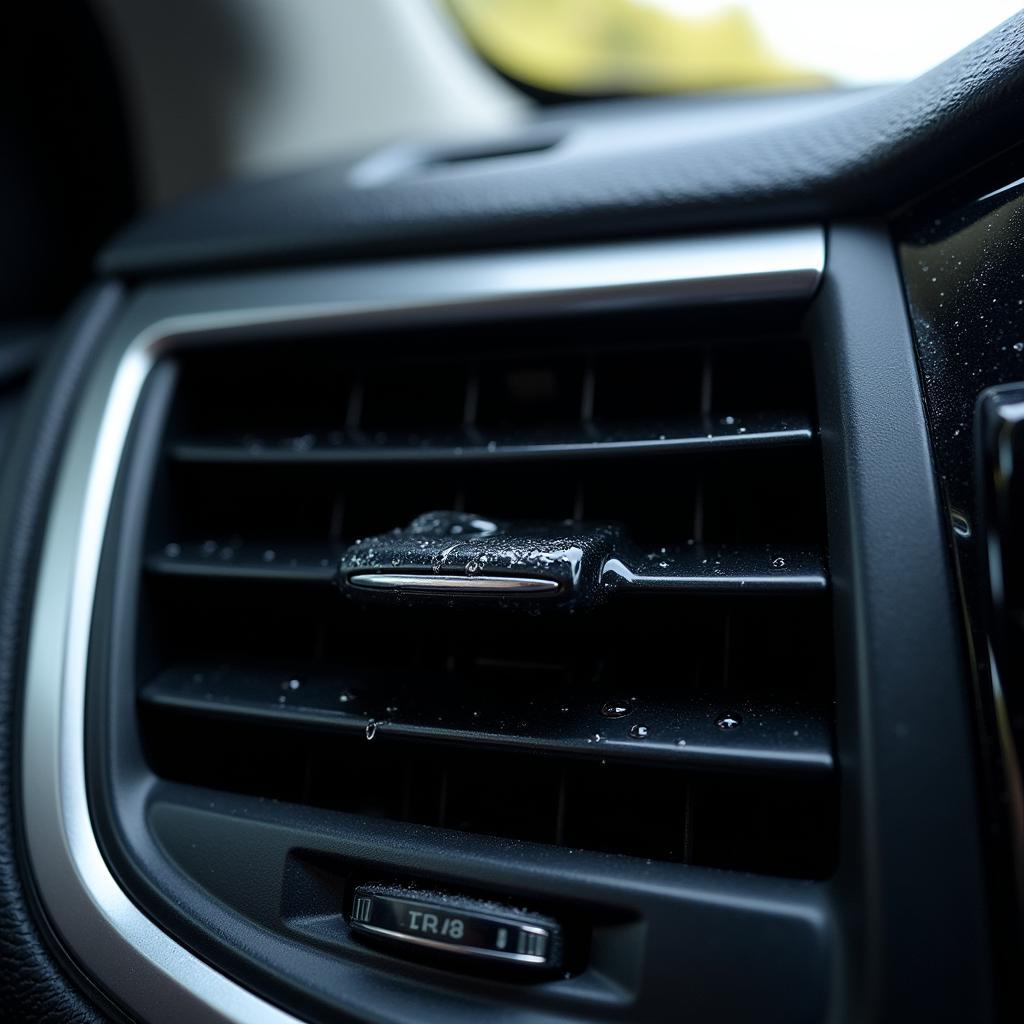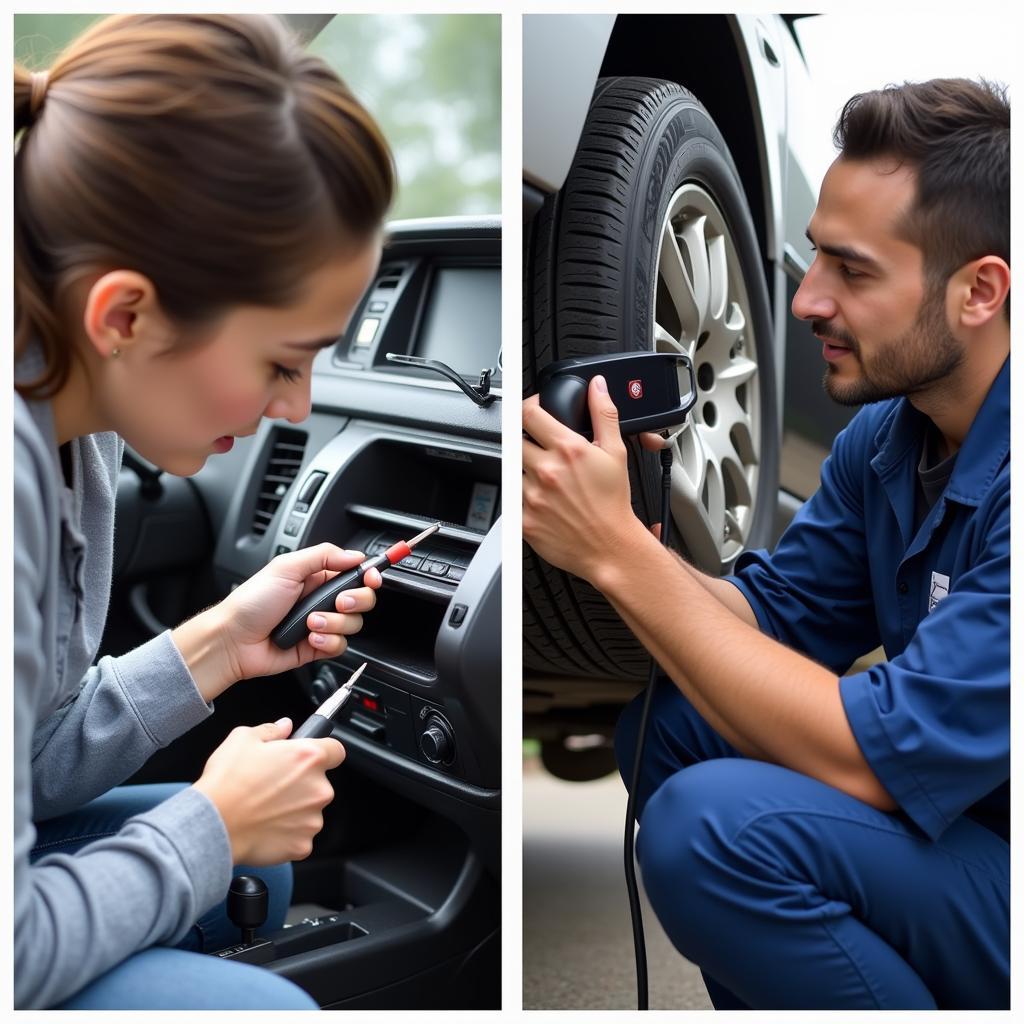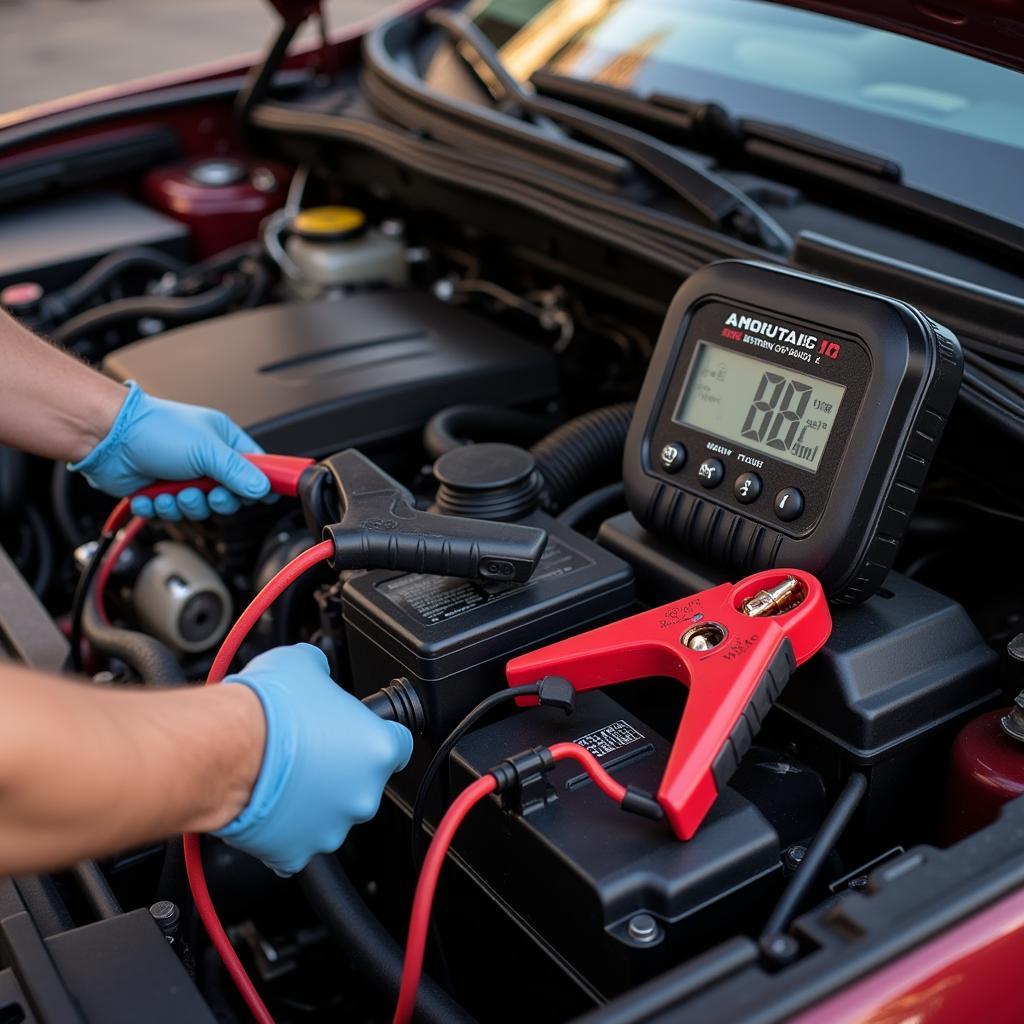Experiencing a sweltering commute because your car AC is blowing hot air? Don’t sweat it! This comprehensive guide will walk you through the common reasons behind car AC issues and how to tackle them. Whether you’re a DIY enthusiast or prefer seeking professional help, we’ve got you covered.
 Car AC blowing hot air
Car AC blowing hot air
Understanding Your Car’s Air Conditioning System
Before diving into troubleshooting, it’s helpful to grasp the basics of how your car’s AC system functions. In a nutshell, it works similarly to your home AC, utilizing refrigerant to absorb heat and cool the air inside your car.
Here’s a simplified breakdown of the key components:
- Compressor: This component pressurizes and circulates the refrigerant throughout the system.
- Condenser: Located at the front of your vehicle, often in front of the radiator, the condenser cools the refrigerant, converting it from a high-pressure gas to a high-pressure liquid.
- Evaporator: Positioned inside the dashboard, the evaporator is responsible for absorbing heat and humidity from the cabin air, effectively cooling the air blown into your car.
- Receiver-dryer/Accumulator: This component stores the refrigerant and removes any moisture from the system.
- Expansion valve/Orifice tube: This part regulates the flow of refrigerant into the evaporator.
Common Car AC Problems and How to Fix Them
 Car AC not blowing cold air
Car AC not blowing cold air
Now, let’s address some common car AC problems and their potential solutions:
1. AC Blowing Hot Air
This is often the first sign of an issue. Here are the usual suspects:
- Low Refrigerant: One of the most prevalent reasons for a malfunctioning car AC is low refrigerant levels, often caused by leaks.
- Solution: A qualified technician can pinpoint and seal the leak before recharging the system with the appropriate refrigerant. You can find reliable services for ac fixing for car near me.
- Faulty Compressor: A failing compressor won’t be able to circulate the refrigerant effectively.
- Solution: Depending on the severity of the issue, the compressor might require repairs or a complete replacement.
- Electrical Issues: Problems with the AC system’s wiring, fuses, or relays can disrupt its operation.
- Solution: A thorough inspection by a mechanic can identify and address any electrical faults.
2. Weak Airflow
If you notice a decrease in the intensity of air blowing from your vents, it could be due to:
- Clogged Cabin Air Filter: Just like your home AC, a dirty cabin air filter can restrict airflow.
- Solution: Replacing the cabin air filter is a simple yet effective fix.
- Blocked Vents: Obstructions in the vents themselves can hinder airflow.
- Solution: Inspect the vents for any blockages and remove them carefully.
3. Strange Noises
Unusual sounds emanating from your AC system are often a telltale sign of underlying problems.
- Whistling or Hissing: This could indicate a refrigerant leak.
- Solution: Locating and repairing the leak is crucial to prevent further damage and ensure optimal AC performance.
- Clicking or Clunking: These sounds might point towards a failing compressor or other mechanical issues.
- Solution: Immediate attention from a qualified mechanic is recommended to diagnose and address the problem.
4. AC System Not Turning On
If your car AC refuses to turn on at all, it could be attributed to:
- Blown Fuses or Relays: A blown fuse or relay in the AC circuit can completely cut off power to the system.
- Solution: Inspecting and replacing any faulty fuses or relays is a relatively straightforward fix.
- Faulty AC Control Module: This module controls various aspects of your AC system, and a malfunction can render it inoperable.
- Solution: A professional diagnosis is necessary to determine if the AC control module requires repair or replacement.
DIY vs. Professional Car AC Repair
 Car AC repair DIY vs. Professional
Car AC repair DIY vs. Professional
While some car AC issues, like replacing a cabin air filter, can be handled with basic DIY skills, others demand the expertise of qualified technicians. Here’s a guide to help you decide when to roll up your sleeves and when to seek professional assistance.
DIY Fixes
- Replacing the Cabin Air Filter: This is a relatively simple task that most car owners can do themselves. Consult your owner’s manual for the filter location and replacement instructions.
- Checking and Cleaning Vents: Inspecting and clearing any visible obstructions from the AC vents is another manageable DIY task.
When to Call a Professional
- Refrigerant Leaks and Recharge: Handling refrigerant requires specialized knowledge and equipment. It’s best to leave leak detection and system recharge to certified professionals. Consider searching for ” fix my car ac compressor palm springs” if you are located in that area.
- Compressor Issues: Diagnosing and repairing or replacing a faulty compressor necessitates professional expertise.
- Electrical Problems: Addressing electrical issues with your car’s AC system is best left to qualified mechanics.
Maintaining Your Car’s AC System
Just like any other component of your vehicle, regular maintenance can significantly extend the lifespan of your car’s AC system and prevent costly repairs down the line. Here are some preventive measures:
- Regular Inspections: Have your car’s AC system inspected by a qualified technician at least once a year, preferably before the start of summer.
- Timely Refrigerant Recharge: If your AC isn’t cooling as efficiently as it used to, a refrigerant recharge might be necessary.
- Cabin Air Filter Replacement: Replace your cabin air filter every 12,000 miles or as recommended in your car’s owner’s manual.
- Run Your AC Regularly: Even during cooler months, run your car’s AC for a few minutes every couple of weeks to keep the system lubricated and prevent refrigerant leaks.
Conclusion
A properly functioning car AC is essential for a comfortable driving experience, especially during warmer months. By understanding the common issues, knowing when to attempt DIY fixes, and prioritizing regular maintenance, you can keep your car cool and comfortable for years to come. If you’re experiencing persistent AC problems, don’t hesitate to reach out to the experts at AutoTipPro for reliable car AC repair services. You can call us at +1 (641) 206-8880 or visit our office located at 500 N St Mary’s St, San Antonio, TX 78205, United States. We’re here to help you beat the heat!
FAQs
1. How often should I recharge my car’s AC?
While a well-maintained car AC system shouldn’t require frequent recharges, it’s generally recommended to have it checked every 2-3 years or if you notice a decline in cooling performance.
2. Can I use a DIY AC recharge kit?
While DIY recharge kits are available, using them without proper knowledge can potentially damage your AC system. It’s advisable to consult a professional for refrigerant recharge.
3. How much does it cost to fix a car AC?
The cost of car AC repair can vary significantly depending on the nature and severity of the problem. Simple fixes like refrigerant recharge might cost around $100-$200, while more complex repairs involving compressor replacement can range from $500 to over $1,000. For an accurate estimate, it’s best to consult a qualified mechanic. Consider searching for “where to go to fix car ac” or “best mechanic fix my car air conditioner palm springs” to find reputable options in your area.
4. How can I prevent my car AC from smelling musty?
A musty smell often indicates mold or mildew growth within the AC system. Regularly replacing your cabin air filter and running your AC on the fresh air setting for a few minutes after use can help prevent moisture buildup and odor.
5. Can I drive my car with a broken AC?
While driving with a broken AC might not directly harm your car, it can be uncomfortable, especially during hot weather. Moreover, a malfunctioning AC might indicate a more serious underlying issue. It’s best to have it diagnosed and repaired as soon as possible.






Leave a Reply